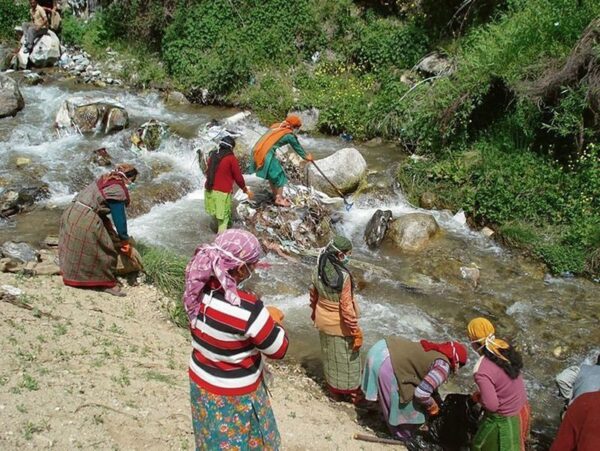News
Garbage Left by Tourists and Trekkers in the Dhauladhars Poses a Growing Ecological Threat

Each weekend, large numbers of tourists from Punjab, Chandigarh, Jammu and Kashmir, and Delhi flock to Bir-Billing, Rajgundha, and the Barot Valley.
The pristine Dhauladhar mountain range, which spans scenic areas such as Bir-Billing, Rajgundha, Multhan, Kothikohar, and Barot, is facing a serious ecological threat from uncontrolled waste disposal. Tourists and trekkers routinely litter the region with plastic wrappers, bottles, and other non-biodegradable waste, putting the fragile mountain ecosystem at risk.
Despite repeated concerns raised by environmentalists and local residents, authorities — including the Forest Department — appear indifferent. The problem has worsened since the opening of the Bir-Barot route, and in the absence of any enforcement, lush green forests are increasingly turning into dumping grounds.
On weekends, a surge of visitors from neighboring states descends on Bir-Billing, Rajgundha, and the Barot Valley, leaving behind heaps of trash that tarnish both the region’s beauty and its ecology. According to locals, piles of discarded plastic packets, bottles, and wrappers are now a common sight in the upper stretches of the Dhauladhar range.
Over the past few years, Bir-Billing, Rajgundha, and Chhota Bhangal have emerged as popular tourist destinations. Experts estimate that each tourist generates an average of three to four kilograms of waste. Hundreds of vehicles carrying tourists enter Chhota Bhangal and Barot every day. Litter scattered across the higher mountain trails has now become a familiar sight. Trekkers frequently dump waste along routes, and since plastic takes years to decompose, the long-term environmental damage is significant.
The situation is even worse in newly popular destinations like Barot, Multhan, and Rajgundha, where there are no proper waste disposal systems. Most of the garbage generated by hotels and locals is thrown directly into the Uhl River. Environmental activists have voiced concern over the river’s pollution and urged the authorities to implement proper waste management and monitoring.
Since the end of the monsoon, the number of tourists has surged dramatically, especially on weekends. Local environmentalists have called on the government to launch awareness drives urging tourists and pilgrims not to dump plastic or other waste in the hills, rivers, or along roadsides. One environmentalist suggested distributing awareness pamphlets at border checkposts.
K.B. Ralhan, a member of the local NGO People’s Voice, said, “Preserving the region’s biodiversity is impossible without the cooperation of tourists. Unfortunately, many lack civic sense and continue to discard plastic waste in forests, rivers, and streams.”
Anurag Sharma, president of the Bir-Billing Paragliding Association, suggested that the government introduce a green tax to fund conservation and cleanup efforts. “At present, neither the Forest Department nor the Special Area Development Authority (SADA) has the funds to tackle this issue,” he said, noting that states such as Kerala, Kashmir, and Uttarakhand have already implemented similar taxes — and Himachal Pradesh should follow suit.
